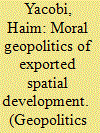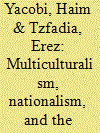|
|
|
Sort Order |
|
|
|
Items / Page
|
|
|
|
|
|
|
| Srl | Item |
| 1 |
ID:
080917


|
|
|
|
|
| Publication |
2008.
|
| Summary/Abstract |
This article critically examines the role of architecture in the construction of national identity. Through critical analysis of architectural representations, I study the interrelations between the production of the architectural object and the practice of construction of Israeli national identity. The existing body of knowledge that supports this article claims that the creation of national identity is a socially constructed process which involves a variety of practices including education, music, and army service, as well as designing the built environment. It is important to note that the realization of such practices does not occur as a natural process, but rather as a result of power relations embodied within the national sphere
|
|
|
|
|
|
|
|
|
|
|
|
|
|
|
|
| 2 |
ID:
134625


|
|
|
|
|
| Summary/Abstract |
This article will focus on an ongoing process of Jerusalem’s contested urban space during the last decade namely the immigration of Palestinians, mostly Israeli citizens, to “satellite neighbourhoods”, i.e. Jerusalem’s colonial neighbourhoods that were constructed after 1967. Theoretically, this paper attempts to discuss neighbourhood planning in contested cities within the framework of geopolitics. In more details, we will focus on the relevance of geopolitics to the study of neighbourhood planning, by which we mean not merely a discussion of international relations and conflict or of the roles of military acts and wars in producing space. Rather, geopolitics refers to the emergence of discourses and forces connected with the technologies of control, patterns of internal migrations by individuals and communities, and the flow of cultures and capital.
|
|
|
|
|
|
|
|
|
|
|
|
|
|
|
|
| 3 |
ID:
099048


|
|
|
|
|
| Publication |
2010.
|
| Summary/Abstract |
This article will analyse Israel's past involvement (1956-1973) in Africa, in the context of a wider theoretical conceptualisation of the role of spatial development in the construction of moral geopolitics. Re-thinking the relevance of postcolonial critiques, the paper examines the political and institutional setup underlying Israeli involvement in development in Africa, documenting the scope of this phenomenon by looking at policy makers, professionals and institutions, studying the role of spatial development and planning in the design of Israel's policies, and analysing the actual results of such projects. Despite considerable Israeli involvement and investment in spatial development projects in postcolonial Africa, the existing literature on the subject is narrow, dealing mainly with pragmatic political interests, and there is hardly any structured documentation of Israel's exported spatial development to Africa - its scope, qualities, successes or failures. Moreover, in the wider literature the analysis of spatial development as "exported" knowledge is perceived as a by-product of the polity between Empires and the Margins - an assumption that this paper aims to question.
|
|
|
|
|
|
|
|
|
|
|
|
|
|
|
|
| 4 |
ID:
090394


|
|
|
|
|
| Publication |
2009.
|
| Summary/Abstract |
One of the central issues in the study of urban politics today is the fact that many cities have become multicultural arenas. The liberal viewpoint stresses the potential of the city-unlike other spaces-to offer many and equal opportunities for all residents regardless of religion, gender, or ethnic affiliation, but the critical body of knowledge highlights the ways in which the city, although apparently released from the shackles of nation- and state-building projects, continues to reproduce existing power structures and is a stratifying place, maintaining patterns of discrimination, exclusion, and segregation. This tension between the city as an enabling space versus the city as a reinforcer of socionational stratification is at the center of this article.
|
|
|
|
|
|
|
|
|
|
|
|
|
|
|
|
| 5 |
ID:
188236


|
|
|
|
|
| Summary/Abstract |
This article discusses the challenges that the settlement process poses to Israeli property regimes, examining the ways that public apparatuses, specifically those related to urban planning, are creatively mobilized to address and mitigate such challenges. The article focuses on two case studies: the Palestinian village of Kamanneh in the Upper Galilee and the Ganey Aviv neighborhood of Lydda, one of Israel’s so-called mixed cities. Based on these case studies, the paper argues that the planning process’s technical and legal manipulations as well as the raw political power involved produce and reproduce the settler-colonial logic of ownership in land as a territorial and symbolic mechanism of control.
|
|
|
|
|
|
|
|
|
|
|
|
|
|
|
|
| 6 |
ID:
177275


|
|
|
|
|
| Summary/Abstract |
This article focuses on the interrelationship between colonial development in Israel and the export of knowledge and practices to Africa. We argue that at the core of the Israeli aid project to Africa is the Cold War and the global technopolitics of this era, that is, the use of technological methods and practices to achieve political ends. The main question to be discussed throughout this article is whether the Zionist settlement enterprise and its ‘export’ to Africa is not only a unique historical event but rather is part of the global imperial debate. We point to the way in which the technopolitics of development in Israel is directly related to the concepts prevalent in the country during the period under discussion in several interrelated ways. First, it was embedded in an Orientalist discourse in which the ‘backward native’ becomes a consumer of modern technologies migrating from a territory where knowledge is produced to the territories that consume its products. Second, the view of Africa was part of a wider epistemological system in which orientalism was also ‘inward’ both toward the Jewish Mizrahi population and to the Palestinian population.
|
|
|
|
|
|
|
|
|
|
|
|
|
|
|
|
|
|
|
|
|